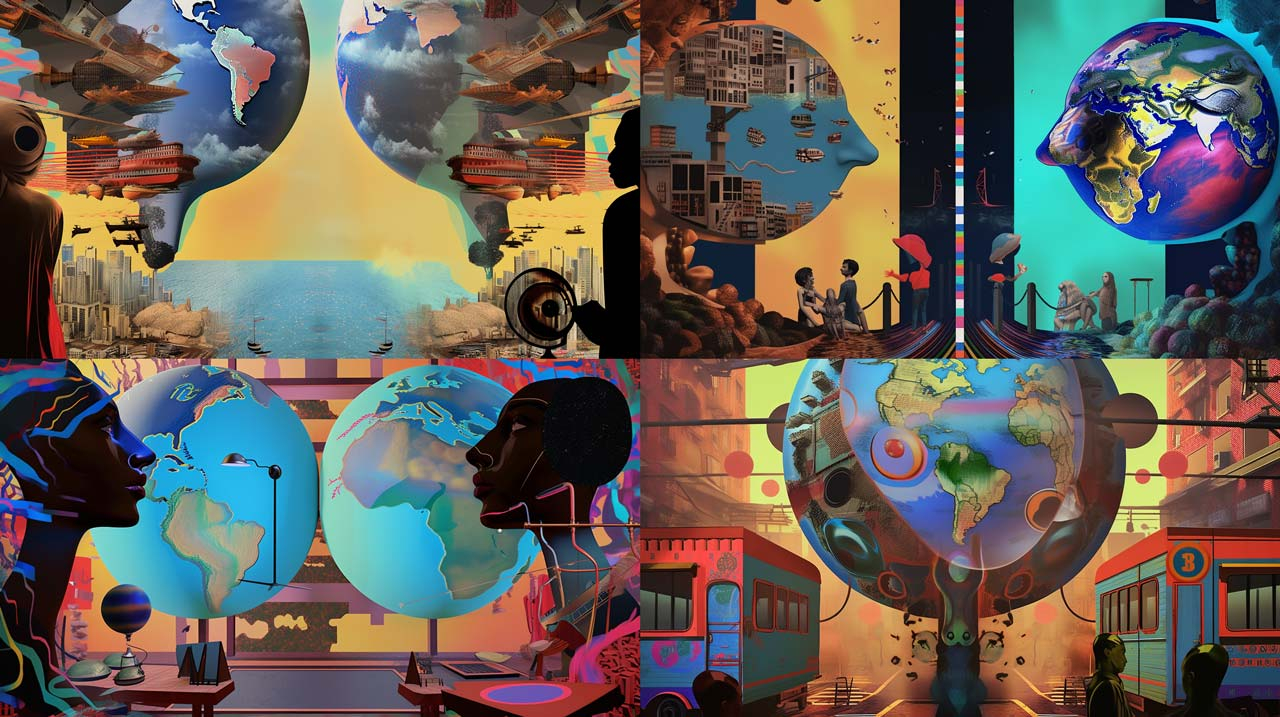LASER Talk - Intersecting Realities
.2023 19:00

Intersecting Realities: Exploring the Metaverse through the Lens of Art and Science
The Metaverse is “a post-reality universe, a perpetual and persistent multiuser environment merging physical reality with digital virtuality. It is based on the convergence of technologies that enable multisensory interactions with virtual environments, digital objects and people such as virtual reality (VR) and augmented reality (AR).” [Mystakidis 2022].
The term ‘Metaverse’ was coined and used in Neal Stephenson’s 1992 novel “Snow Crash”, and Ernest Cline's 2011 “Ready Player One”. The situation changed when Facebook rebranded as part of Meta Platforms Inc. in October 2021. Whereas the novelists' vision of the Metaverse is generally a dystopian one, the current protagonists and promotors bring forward a more positive view, as for example the procuration of new meanings of live or contribution to improve society [Ball 2022].
One could imagine the Metaverse becomes something other than an extension of today’s mass market culture, connecting physical and virtual worlds to create new spaces? What if the Metaverse contributed indeed to increase our resilience in the current Anthropocene, to rethink our relations to other humans, other beings, and matter, also transcending the limitations of a physical space. [Friess, Ruche 2023]?
The Metaverse, virtual worlds, and Web 4.0 have emerged as transformative trends shaping the future of our digital societies, by using technologies like augmented and virtual reality, artificial intelligence, and blockchain.
Nevertheless, there are some related challenges to it - namely artists are concerned about the protection of their intellectual property within the metaverse, as it becomes increasingly difficult to prevent unauthorized use, reproduction, or distribution of their works, and surveillance. Some artists also worry that the immersive nature of virtual environments could lead to a loss of genuine human interaction, making artistic experiences less meaningful.
From a societal and ethical perspective, it will be important to ensure equal access to the metaverse, and not to forget issues such as the potential for addiction, manipulation, and energy consumption.
Artists and scientists together could generate a synergistic view and energy on the Metaverse, that leads to the creation of an immersive, accessible, and empowering digital environment. By combining the creativity of both, we can envision a digital realm that transcends the ordinary and elevates human experiences. It is crucial to remain vigilant in ensuring that the metaverse does not become overly commercialized or controlled by a select few, which could stifle our imagination and limit the diversity of opinions.
Bruno Dumas
Bruno Dumas, Professor at the faculty of computer science of Université de Namur, obtained his doctorate in 2010 from the University of Fribourg, Switzerland. His doctoral thesis focused on the creation of multimodal interfaces. As post-doc researcher at the Vrije Universiteit Brussel he continued his work on multimodal and cross-media systems. At present he leads the Extended User Interfaces (EXUI) research team, focusing on human-computer interaction, multimodal interfaces, augmented reality, and digital education.
Giusy Caruso
Giusy Caruso, Chairwoman of the CREATIE Research Group at the Royal Conservatoire of Antwerp, artist-researcher and professional concert pianist oriented towards the futuristic nexus of art-science-technology. Her research explores novel forms of human-machine interaction for the creation of XR performances, the analysis of gestures and AI Musicking via Machine Learning –in co-creative projects that combines music, dance, theatre and the active participation of spectators.
Eric Joris
Eric Joris, is a Belgian multidisciplinary artist and stage director. In 1991 he founded CREW, pioneering research on how technology influences us and enables us to switch in real-time between different worlds. Scientific Fiction is an apt description of Eric Joris’ modus operandi. Today, CREW is driven by two artists: Eric Joris and Isjtar Vandebroeck.
Isjtar
Isjtar Vandebroeck, media artist, game developer and now technical director. Together with other returning collaborators and cocreators, they lead the audience through virtual and real spaces, integrating ordinary i-pads, motion capture suits or StrapTrack systems into digital art with VR devices.
Peter Friess
Peter Friess (artist name Petermfriess) has a background in self-organizing social systems (Ph.D.) and space technology. Besides his activities in ICT innovation, he is an interdisciplinary artist and researcher with an interest in artificial intelligence, and humanities. His focus is on the connection of societal changes with transdisciplinary processes. His work has been shown around the world at exhibitions and festivals.
Alexandra Dementieva
Alexandra Dementieva is a multimedia artist based in Brussels. The idea of interaction between the viewer and an artwork, mediated by technologically progressive visualization methods, lies at the core of her work. Her installations focus on the role of the viewer and her/his interaction with an artwork and bring forth ways of provoking the viewer’s involvement, thus allowing hidden mechanisms of human behaviour to be revealed.
LASER Talks
The Leonardo/ISAST LASER Talks are a program of international gatherings that bring artists, scientists, humanists and technologists together for informal presentations, performances and conversations with the wider public.
Credits
Illustration by Peter Friess & Midjourney